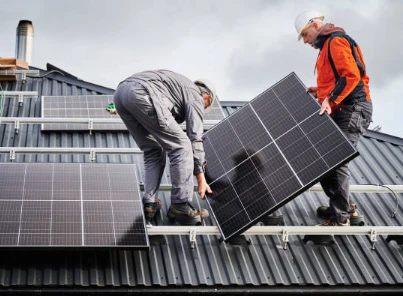Solar panel installation is now simpler than ever. Learn how grants may cut your total installation costs.
Understanding Solar Panel Installation
Solar panel installation involves setting up photovoltaic (PV) systems to convert sunlight into electricity. The process requires professional solar installers who assess the site, mount panels, and connect them to the electrical system. Solar panel installation services ensure proper setup, from securing panels to integrating inverters that convert solar energy into usable power. For businesses, commercial solar panel installation can reduce energy bills and support sustainability goals. Grants available for these projects often cover a portion of the solar panel installation cost, making renewable energy more accessible for companies of all sizes.
Why Consider Commercial Solar Panel Installation?
Commercial solar panel installation is ideal for businesses aiming to lower operating costs and environmental impact. Large-scale systems, designed by skilled solar installers, power offices, warehouses, or factories. These installations use high-capacity panels to meet the energy demands of commercial spaces. The solar panel installation cost for businesses varies based on system size and complexity, but grants can significantly reduce expenses. Programs like the U.S. Department of Agriculture’s Rural Energy for America Program (REAP) offer funding for rural businesses to offset solar panel installation costs, supporting energy efficiency and economic growth.
How Grants Lower Solar Panel Installation Cost
Grants are a key way to reduce the solar panel installation cost for businesses. For example, the REAP program provides funding for renewable energy projects, including solar panel installation, for agricultural producers and rural small businesses. These grants can cover a portion of the project expenses, easing the financial burden. Another option is the U.S. Environmental Protection Agency’s Solar for All program, which supports commercial solar panel installation in low-income or disadvantaged communities. By working with solar installers, businesses can access these funds to make solar panel installation services more affordable, ensuring long-term savings on energy bills.
Role of Solar Installers in the Process
Professional solar installers are essential for successful solar panel installation. They conduct site assessments to determine the best placement for panels, considering factors like sunlight exposure and roof condition. Solar panel installation services include designing the system, securing permits, and ensuring compliance with local regulations. For commercial solar panel installation, installers tailor solutions to meet high energy demands, often integrating battery storage for reliability. Grants often require certified solar installers to ensure quality, so choosing experienced professionals is crucial. This expertise helps businesses maximize the benefits of grants and reduce overall solar panel installation cost.
Types of Grants Available for Solar Installation
Several grant programs support solar panel installation for businesses. The Solar for All program, funded by the Inflation Reduction Act, focuses on expanding solar access in underserved areas, offering funds for commercial solar panel installation. The U.S. Department of Energy’s Weatherization Assistance Program (WAP) also provides grants for energy-efficient upgrades, sometimes including solar projects. These programs help cover the solar panel installation cost, making it easier for businesses to invest in renewable energy. Solar panel installation services often guide clients through the application process, ensuring eligibility and proper documentation.
Additional Incentives Beyond Grants
Besides grants, businesses can benefit from other incentives to offset solar panel installation cost. The federal Investment Tax Credit (ITC) allows companies to claim a percentage of their solar project expenses as a tax credit. Net metering, available in some states, lets businesses sell excess solar energy back to the grid, further reducing costs. Solar installers can advise on these incentives, ensuring businesses maximize savings. Combining these with grants makes commercial solar panel installation more financially viable, encouraging adoption of clean energy solutions.
Steps to Access Grants for Solar Installation
To benefit from grants, businesses must follow specific steps. First, contact solar panel installation services to assess project feasibility and estimate costs. Next, research available grants, such as REAP or Solar for All, checking eligibility criteria like location or business type. Solar installers often assist with grant applications, providing technical details required by funding programs. Submitting accurate documentation, including energy audits or project plans, is crucial. Once approved, grants can significantly lower the solar panel installation cost, making commercial solar panel installation a practical investment for businesses.
Long-Term Benefits of Solar Panel Installation
Investing in solar panel installation offers long-term advantages. Businesses reduce energy expenses, as solar power offsets reliance on traditional electricity. Commercial solar panel installation also enhances a company’s sustainability profile, appealing to eco-conscious customers. With grants and incentives, the solar panel installation cost becomes more manageable, shortening the payback period. Solar panel installation services ensure systems are durable, often lasting over 20 years, providing consistent savings. By working with qualified solar installers, businesses can achieve reliable, cost-effective energy solutions tailored to their needs.
Conclusion: Making Solar Accessible
Solar panel installation is a smart choice for businesses seeking sustainable energy solutions. Grants like REAP and Solar for All reduce the solar panel installation cost, making commercial solar panel installation more accessible. Professional solar installers play a vital role in designing efficient systems and navigating funding options. By leveraging solar panel installation services and available grants, businesses can lower expenses, enhance energy efficiency, and contribute to a greener future. Exploring these opportunities ensures a smooth transition to solar power with lasting financial and environmental benefits.





